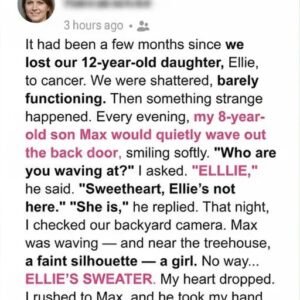When I married David Miller three years ago, I believed we were building a partnership based on love, trust, and respect. We lived in Denver, Colorado, where I worked as a financial analyst while David ran a small construction company he inherited from his father. Life wasn’t perfect, but I thought we were doing well. I had been carefully saving for years—nearly $60,000—planning for a down payment on our first home. That money, to me, represented security, independence, and the life we had promised each other.
One afternoon, after a long day at work, I logged into my bank account to transfer some funds. My heart dropped. The savings account I had worked so hard to build was nearly empty—only $500 remained. At first, I thought it had to be some kind of banking error. My hands trembled as I scrolled through the transactions. But the truth hit me like a slap: the money had been withdrawn in large chunks over the past week, transferred into an account under the name “Linda Miller.” My mother-in-law.
When David came home that evening, I confronted him. “David, where is my money? Why did your mother take it?”
He didn’t even flinch. Instead, he sighed heavily, as if I were the one being unreasonable. “Emily, she had no choice. Mom was drowning in credit card debt and medical bills. She would have lost her house. You know she raised me all on her own after Dad died. I couldn’t let her suffer.”
I was speechless. My entire savings, taken without my consent, and his response was justification?
“That was our future, David. Our home. Our family plans. How could you just let her take it without even asking me?” My voice cracked.
His answer cut me deeper than the theft itself: “She is my mother. You shouldn’t be so calculating about money when family is in need.”
That night, I lay in bed unable to sleep, staring at the ceiling. Betrayal wrapped around me like a cold blanket. It wasn’t just about money. It was about trust. The man I thought would protect my interests had chosen his mother over me—and he didn’t even see it as wrong.
The days following that confrontation were a blur of arguments, silence, and broken trust. I avoided my mother-in-law’s calls, unable to even hear her voice without feeling rage boil inside me. David, on the other hand, acted as though the problem was already resolved. He expected me to simply “move on.”
But I couldn’t. Every time I opened my banking app and saw the empty account, it was like a dagger to the chest. I had grown up in a middle-class household where my parents drilled into me the importance of saving, planning, and never depending on others for stability. To see all my efforts vanish overnight because of someone else’s irresponsibility—it was unbearable.
I demanded a face-to-face conversation with Linda. We met at her house, a modest two-bedroom home on the outskirts of Denver. She greeted me with forced politeness, but there was no remorse in her eyes.
“Emily, I know you’re upset,” she began, “but you have to understand, I didn’t have a choice. The creditors were calling every day. If I lost this house, where would I go?”
I clenched my fists under the table. “You had no right to take my savings. That money wasn’t yours. You didn’t even ask me.”
Linda’s response was chilling in its entitlement. “You’re married to David. What’s his is yours, and what’s yours is his. That means it’s family money. And as family, I had a right to it.”
I stared at her, stunned by the audacity. It wasn’t just that she had taken the money—it was that she believed she was entitled to it.
But his reply was the same: “I’m her only son. I’ll always take care of her. Why can’t you just understand?”
It was then that a cold realization settled in: in his eyes, I would never come first. I would always be second to his mother. And as much as I wanted to save our marriage, I knew I couldn’t live my life feeling like an afterthought.
Weeks turned into months, and the tension in our home grew unbearable. I no longer trusted David with finances. I opened a separate bank account, one he had no access to, and began diverting part of my paycheck there. I stopped sharing my future plans with him because I no longer believed we shared the same future.
The final straw came when David suggested, casually, that once we rebuilt our savings, we might need to help his mom again if her debts piled up. My chest tightened with anger. “Are you serious? After everything that happened, you’d let her take our money again?”
He looked at me like I was the one being unreasonable. “Emily, she’s my mother. That will never change.”
That night, I packed a suitcase. I stayed with my friend Claire for a week, giving myself space to think. I reflected on what I wanted in a marriage: trust, equality, partnership. Not secrecy, betrayal, and constant competition with a mother-in-law who saw me as a wallet instead of family.
One evening, as I sat on Claire’s porch watching the sun dip behind the Rocky Mountains, I made my decision. I couldn’t stay married to a man who didn’t respect me enough to protect my financial security.
When I told David I wanted a divorce, he was shocked. “You’d throw everything away over money?” he asked bitterly.
I shook my head, tears streaming down my face. “No, David. I’m leaving because of trust. Because you chose your mother’s debts over our future. Because you never once stood up for me.”
The divorce wasn’t easy. Linda called me selfish, ungrateful, even heartless. But I ignored her words. I found a small apartment near downtown Denver and started over.
It took time, but slowly, I rebuilt my savings, my confidence, and my peace of mind. I learned a painful but valuable lesson: love alone is not enough. A marriage needs trust, respect, and boundaries. Without those, it’s just an illusion.
And as much as it hurt to walk away, I knew it was the only way to reclaim my life.






